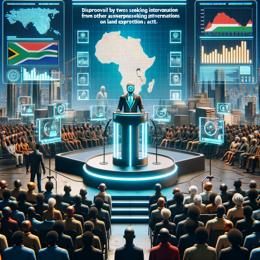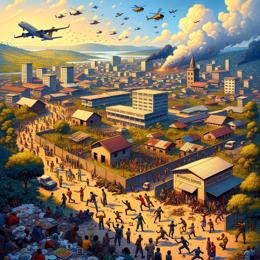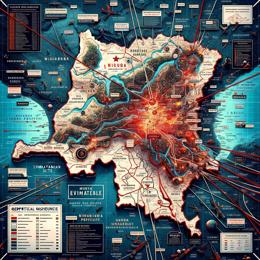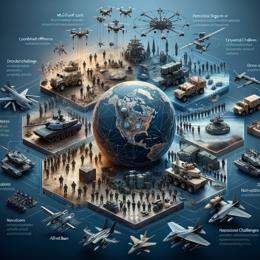Image created by AI
Haiti's Descent into Chaos: Gangs Advance Amidst Political Turmoil and Humanitarian Crisis
The worsening situation in Haiti has reached a new boiling point with the advancement of gangs throughout Port-au-Prince. The United Nations has expressed heightened concern as these criminal organizations expand their territory and exert control over various neighborhoods in the capital city. With the political scene in turmoil and assault on daily life becoming more hazardous, the country stands on the brink of total collapse.
A recent clash with security forces led to the death of Ernst Julme, known as Ti Greg, the leader of the Delmas 95 gang, suggesting an escalation in confrontations between law enforcement and gang members. This incident underscores the rampant lawlessness pervading in Haiti's streets.
Ulrika Richardson, the UN humanitarian coordinator, pointed out the harsh realities faced by Haitians, reporting from the ground via videolink. Roadblocks, gunfire, and substantial displacement of the populace are symptoms of a society being torn apart from within. Richardson highlighted the challenges police face as gangs seize newer areas, complicating not only day-to-day life but also stymying any meaningful political dialogue.
Political stagnation adds further complexity to the crisis. Prime Minister Ariel Henry, currently stationed in Puerto Rico due to airport closures in Haiti, agreed to resign to allow the creation of an interim government amidst international and local pressure. However, the process has been notably slow, bogged down by sluggish negotiations, even as violence festers.
Lascahobas, a town about 80 kilometers from the capital, experienced its share of violence with reports from Haitian police of an alleged gang member being lynched by a mob after being taken from police custody. The situation is underlining the fearful symmetry of violence and impunity that has taken root in the country.
The UN Security Council's call for countries to enforce an arms embargo on Haiti points to the international community's awareness of the external factors fuelling the instability. Despite the global body's support for a Haitian-led political process and free and fair elections, the situation on the ground remains far from conducive for such democratic exercises.
The transitional council's challenges reflect the deep divisions and lack of trust not only between political factions but also within the broader Haitian population who remain skeptical of political maneuvers as gangs continue to wield significant power.
UN Secretary-General Antonio Guterres has expressed cautious optimism at the nomination of representatives to the transitional Presidential Council, urging stakeholders to work cohesively towards restoring governance. Amidst these developments, the World Health Organization (WHO) shines a light on another pressing issue – the healthcare crisis exacerbated by the closure of Port-au-Prince's airport, hindering essential imports, including medicine, during an ongoing cholera outbreak.
The United States, recognizing the precarious situation, has evacuated more citizens from Haiti. Yet, such efforts are like bandages on a hemorrhaging wound, providing individual relief but not addressing the systemic hemorrhage of stability in Haiti.
In the backdrop of this multi-dimensional crisis, Haiti teeters on the edge, with its people facing existential challenges every day, and its future as a cohesive state in a perilous balancing act.










